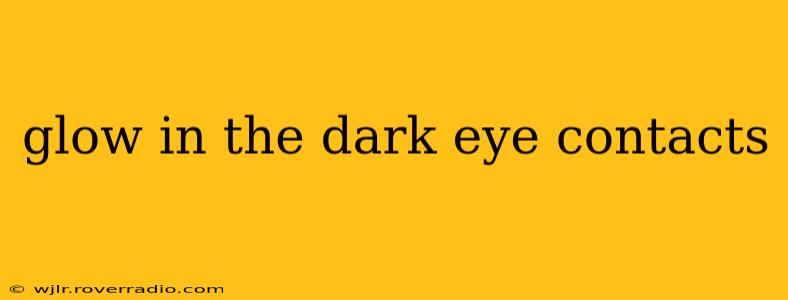Glow-in-the-dark eye contacts have surged in popularity, offering a striking and eye-catching aesthetic, particularly for Halloween, concerts, and rave events. However, the allure of these novelty lenses necessitates a thorough understanding of their safety and proper usage. This guide delves into the crucial aspects of glow-in-the-dark contacts, addressing common concerns and providing valuable insights for responsible use.
What are Glow-in-the-Dark Eye Contacts?
Glow-in-the-dark eye contacts aren't truly "glowing" in the sense of emitting their own light. Instead, they're designed with special pigments that absorb light and then slowly release it over time, creating a luminescent effect. This process is known as phosphorescence. The pigments are incorporated into the contact lens material, allowing the wearer's eyes to appear to glow faintly in low-light conditions. The intensity of the glow depends on the amount of light absorbed beforehand.
Are Glow-in-the-Dark Eye Contacts Safe?
This is the most critical question. The safety of glow-in-the-dark eye contacts hinges entirely on their source and proper usage. Crucially, lenses obtained from unregulated sources, like online marketplaces without proper verification, pose significant risks. These unregulated lenses may:
- Be made from substandard materials: This can lead to irritation, infections, and even corneal damage.
- Not fit properly: Poorly fitting lenses can scratch the cornea, causing discomfort and potential vision impairment.
- Contain harmful chemicals: Some unregulated lenses may contain chemicals that are toxic to the eyes.
Only purchase glow-in-the-dark contact lenses from a licensed optometrist or ophthalmologist. They can ensure the lenses are FDA-approved (in the USA) or meet equivalent safety standards in your country, and they'll properly fit the lenses to your eyes. They can also educate you on safe handling and care.
How Long Do Glow-in-the-Dark Contact Lenses Last?
The lifespan of glow-in-the-dark contact lenses varies depending on the brand and the type of lens (daily disposables, monthly disposables, etc.). Always adhere to the manufacturer's instructions for replacement. Improperly caring for or extending the use beyond the recommended timeframe drastically increases the risk of infection.
Where Can I Buy Safe Glow-in-the-Dark Contact Lenses?
As emphasized repeatedly, only purchase from reputable sources such as licensed eye care professionals. Avoid buying from online marketplaces or street vendors, as these lenses are unlikely to meet safety standards. Your eye health is paramount. A consultation with an eye care professional is essential before using any type of contact lens, including novelty lenses.
How Do I Care for Glow-in-the-Dark Contact Lenses?
The care instructions are similar to regular contact lenses. Follow your optometrist's guidance and the manufacturer's instructions meticulously. This generally includes:
- Proper cleaning and disinfection: Use the recommended cleaning solution and follow the precise steps.
- Storage: Store the lenses in a sterile lens case with fresh solution when not in use.
- Regular replacement: Replace lenses according to the recommended schedule to minimize the risk of infection.
Are Glow-in-the-Dark Contacts Legal?
The legality of glow-in-the-dark contact lenses depends on your location and whether they meet the necessary safety regulations. Always check your local laws and regulations before purchasing or using them. In many jurisdictions, only FDA-approved (or equivalent) contact lenses are legally permissible.
What are the potential risks of wearing glow-in-the-dark contact lenses?
The risks are substantial if you choose unsafe lenses or don’t follow proper care instructions. These include:
- Eye infections: Bacteria or fungi can easily infect the eye, leading to serious complications.
- Corneal abrasions: Improperly fitted lenses can scratch the cornea.
- Allergic reactions: Sensitivity to lens materials or solutions can trigger allergic responses.
- Vision impairment: In severe cases, infections or damage can lead to permanent vision loss.
In conclusion, while glow-in-the-dark contact lenses offer a captivating aesthetic, safety must always be the priority. Only purchase from reputable sources, follow all care instructions diligently, and prioritize your eye health. Consulting with an eye care professional before, during, and after use is strongly recommended.
